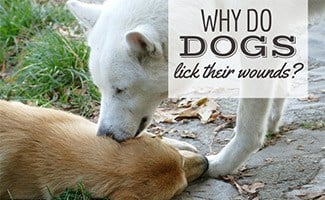
Not only does licking potentially introduce infection but the act of licking can break down tissues and suture. Dogs along with many other animals have an instinctive urge to lick at any wounds they receive.

It is common for animals like cats primates and rodents to lick their injuries.
Is dogs licking their wounds good. Benefits Of Dogs Licking Their Wounds Thanks to all the antimicrobial and healing properties weve looked at your dogs saliva can actually benefit wound healing to a certain degree. When it comes to dogs licking their own wounds a heavy amount of licking is likely to break down stitches and suture and re-open any closed wounds leaving them vulnerable to infection and the accumulation of dirt and debris. Dogs along with many other animals have an instinctive urge to lick at any wounds they receive.
Many people believe thats a good thing saying that dog saliva contains healing compounds. But is that true. Evidence of Saliva Helping Wounds.
Not only does licking potentially introduce infection but the act of licking can break down tissues and suture. Many people still feel that as a natural response of a dog to a wound it is a good idea. We also know that mother dogs lick their puppies at birth and beyond to stimulate defecation and presumably to clean the pups and hide their.
Dog saliva is good for wounds Updated November 29 2020 In these days of the Cone of Shame most people know that pets shouldnt lick their wounds. But there is also a long folk tradition that licking and saliva are good for healing. Licking wounds is an instinct that many mammals including dogs have.
It is common for animals like cats primates and rodents to lick their injuries. Sometimes they can even lick the scrapes and cuts of other animal species. This instinct reduces the risk of infection as it helps mammals keep their open wounds clean.
Although your dog means well when it tries to lick your wounds canine saliva can cause infections in humans. As dog bites carry risk of infection so does licking. It is rare for dog saliva to cause serious injury but it has in more than one case.
Home remedies to prevent your dog from licking their wound. The following home remedies are good ways to clean out your dogs wound that is small enough for you to do so without having to take your dog to the vet. A simple saline solution is probably the simplest yet most effective way to clean out your dogs wound.
Depending on the wound your dogs licking can be positive or negative. Canine saliva can be helpful in cleaning your wound and even healing it. It is said that their saliva may have antimicrobial and healing properties.
Yet it may be important to not let your dog go too crazy with licking away at your wounds. In short dogs lick their wounds because it can promote healing and relieve pain. And although licking can help the healing process in some wounds it can also cause more harm than good more on that below.
Wound licking is an instinctive response in dogs and its one thats found in many other animals such as cats primates and rodents. For wild or feral dogs licking is probably beneficial in cleaning a wound. But wild animals are busy staying safe and finding food whereas a well fed pampered pet can devote a lot of time to licking a wound making it more extensive and sore in the process.
So limiting access to wounds particularly surgical ones with stitches is important. Dogs lick their wounds because it helps to distract them from any pain or irritation that they may feel. Its just like when you hit your elbow or your head and rub the affected area until the pain goes away.
Also the saliva of canines has a mild antibacterial effect that can actually assist in healing their wounds. Dogs cats rodents and primates all lick wounds. There is a common folk belief that animal saliva especially that of dogs has healing properties for human wounds.
It has been long observed that the licking of their wounds by dogs might be beneficial. Indeed a dogs saliva is bactericidal against the bacteria Escherichia coli and Streptococcus canis although not against coagulase-positive Staphylococcus or Pseudomonas aeruginosa.